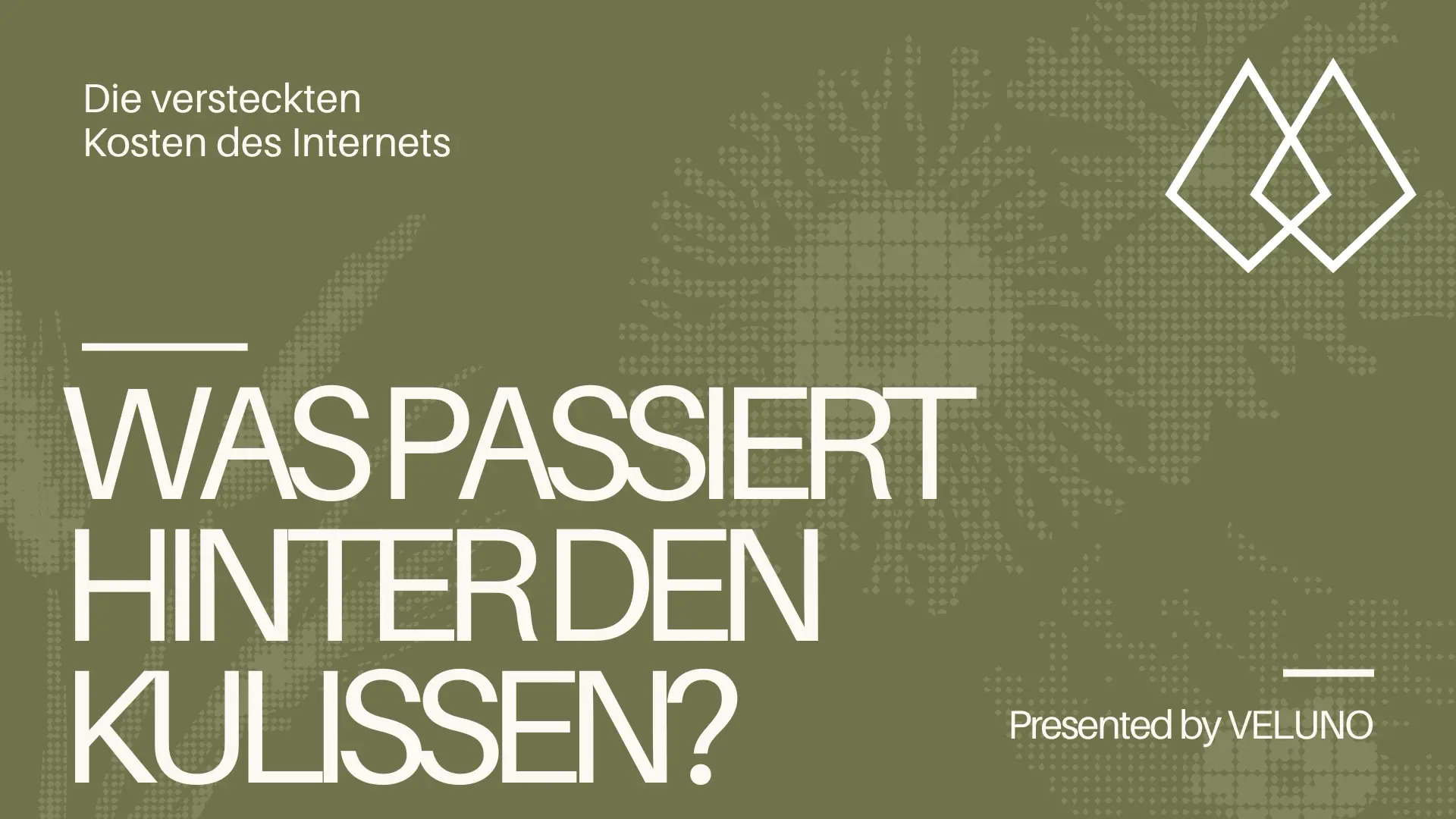
The invisible costs of the Internet
The internet has become an integral part of our everyday lives: we stream, store in the cloud, use social networks and do business online. But behind the convenience are hidden costs - from high energy consumption to data protection issues and environmental impact. Here we shed light on the hidden costs of the digital world - and why VELUNO offers sustainable, efficient web design.
How much energy do websites and data centers consume?
Every website, every cloud storage and every search query consumes energy. Data centers that run billions of pages, apps and services are real power guzzlers.
- ✔ An average data center consumes as much energy as a medium-sized city.
- ✔ The internet is responsible for around 10 % of global electricity consumption - and the trend is rising.
- ✔ A Google search query requires approx. 0.3 Wh - with billions of queries, this adds up enormously.
- streaming is particularly energy-intensive: 1 hour of Netflix can consume as much electricity as a fridge per day.
Why is energy consumption so high?
- Round-the-clock operation: Servers run permanently; extensive cooling is also required.
- Data transmission costs energy: Every picture/video runs via fiber optics, radio masts and satellites.
- Cloud is physical: Each file is stored on real hardware that has to be operated continuously.
Why is VELUNO the solution?
- ✔ Highly optimized loading speed reduces server load and energy consumption.
- ✔ No superfluous code or unnecessary plugins - pure performance.
- ✔ Efficient hosting options for sustainable, resource-saving web development.

Why "free" services are never free
Many services appear to be free - but you pay with data and attention. The business model is based on advertising and data usage.
- ✔Personalized advertising: Platforms analyze surfing behavior for ads.
- ✔Data trading: User data is analyzed and often passed on to third parties.
- ✔Limited privacy: Tracking across multiple websites.
How does VELUNO protect your privacy?
- ✔ No hidden trackers or unnecessary scripts.
- ✔ Privacy-friendly development without excessive data storage.
- ✔ Solutions that often do not require a cookie banner because no unnecessary cookies are set.
The environmental impact of digital growth
- ✔Electronic waste: Million tons of discarded appliances every year.
- ✔CO₂ footprint: Operation of the grid makes a significant contribution to the global balance sheet.
- ✔Resource consumption: Servers/hardware require rare earths and metals.
- ✔Water consumption: Cooling data centers requires enormous amounts of water.
How VELUNO supports sustainable web design
- ✔ Lightweight websites - less server capacity required.
- ✔ Optimized data processing - lower energy consumption during retrieval.
- ✔ Individual solutions instead of bloated CMS structures.
Conclusion: Why VELUNO is the future of sustainable web design
The internet brings benefits, but the hidden costs are real. Conscious use and sustainable technology will make the digital world more efficient and environmentally friendly.
- 🚀 Websites without unnecessary loading times, without superfluous code and without dependencies.
- 🔒 Maximum data protection compliance - often without cookie banners.
- 🌍 Resource-saving, customized web solutions for long-term success.
- 🛠️ Low maintenance, high efficiency - websites that really work.
Every click counts - let's make it sustainable.
FAQ
How much energy do websites and data centers consume?
Every website, cloud storage and search query requires energy. Data centers are power guzzlers; the internet accounts for a significant proportion of global electricity consumption. Streaming services are particularly energy-intensive.
Why is the energy consumption of data centers so high?
- 24/7 operation of servers plus energy-intensive cooling
- Energy requirements for data transmission via global networks
- Physical cloud infrastructure that runs continuously
Why are "free" services never really free?
They are financed through advertising and data usage. Data is analyzed and in some cases passed on to third parties to enable personalized advertising.
How does VELUNO protect your privacy?
- No hidden trackers or unnecessary scripts
- Data-saving implementation without excessive storage
- Solutions without unnecessary cookies - often without cookie banners
What is the environmental impact of digital growth?
- Electronic waste from disused hardware
- CO₂ emissions from network & data center operations
- Resource consumption (rare earths, metals)
- High water consumption for cooling
How does VELUNO support sustainable web design?
- Lightweight, high-performance websites
- Optimized data flows for less energy consumption
- Individual solutions instead of a bloated CMS
Why is VELUNO the future of sustainable web design?
VELUNO develops websites without unnecessary loading times, superfluous code or dependencies - with maximum data protection compliance and sustainable performance.
